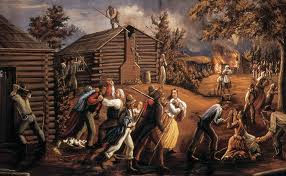
Mobs, those who were antagonistic toward the Mormons, were “heard in every direction” throughout Missouri. The mobs burned houses and crops, rustled cattle, unlawfully detained members of the church, and threatened the Saints with death.
On October 25, 1838, Joseph Smith advised all Saints in outlying areas to move to Far West for safety. Unwilling to abandon his property, Jacob Haun disregarded the Prophet’s counsel and instructed his small community to remain.
On October 27, 1838, Governor Boggs issued his infamous order that “The Mormons must be treated as enemies and must be exterminated or driven from the state”.
Joseph Young, Sr., described the setting at Haun’s Mill on October 30, 1838, “The banks of Shoal creek on either side teemed with children sporting and playing, while their mothers were engaged in domestic employments, and their fathers employed in guarding the mill and other property, while others were engaged in gathering in their crops for their winter consumption. The weather was very pleasant, the sun shone clear, all was tranquil, and no one expressed any apprehension of the awful crisis that was near us—even at our doors.”
At about 4:00pm on October 30, 1838, a mob of about 240 men approached Haun’s Mill. The women and children ran into the woods, while the men sought protection in the blacksmith ship. The military leader of the Saints swung his hat and called for peace. The response to his plea was the sound of a hundred rifles. The mob shot mercilessly at everyone in sight, including women, elderly men, and children. One of the mobsters defended his killing of a small boy by saying, “If he had lived he would have become a Mormon.” Of those that died, most were shot, but many were killed in the most brutal, heinous fashion. In all, at least 17 people died and 13, including Jacob Haun, were wounded.
Years later, Joseph Smith remarked, “At Haun’s Mill the brethren went contrary to my counsel; if they had not, their lives would have been spared.”
The same principle applies today. Our temporal lives may no longer be threatened because of what we believe, but our spiritual lives are constantly being threatened with spiritual death. Our spiritual safety depends on the same action which would have provided temporal safety to those at Haun’s Mill—listening to the council of a living prophet. Ezra Taft Benson has said, “There is no more crucial question that a man should be constantly asking than that which Paul asked: ‘Lord, what wilt thou have me do?’ There is no more essential answer than which he received—of going to those who are authorized by the Lord to give directions.”
Tom Pettit
Want to received our latest blog post? Simply sign up on the left hand side of this page.

